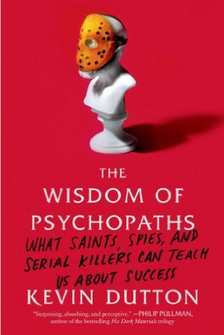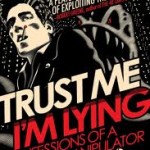The Wisdom of Psychopaths by Kevin Dutton
 The Wisdom of Psychopaths by Kevin Dutton
The Wisdom of Psychopaths by Kevin Dutton
Kevin Dutton, the author of this book is a PhD research psychologist at the Department of Experimental Psychology, University of Oxford. His principal research interests are persuasion and social influence, and the psychopathic personality. This is his 4th book and 3 of them also clearly deal with psychopaths
This book is all about the Psychopathic Personality. While all aspects of this interesting entity are discussed from many view points, I don’t believe a clear definition was put forth- probably because there are some disagreements about many of the fine points. For the purpose of this review I will go by the definition of Psychopathic Personality as being a personality disorder characterized by amorality and lack of affect; capable of violent acts without guilt feelings. In the psychiatric literature the term was superseded by “ sociopathic personality ” which then evolved to the “antisocial personality”
In the latest Diagnostic Statistical Manual-5 ( DSM-5), the term antisocial personality is used and defined as “ A persuasive pattern of disregard for and violation of the rights of others, occurring since age 15 as indicated by THREE (or more) of the following:
- Failure to conform to social norms with respect to lawful behaviors as indicated by repeatedly performing acts that are grounds for arrest
- Deceitfulness as indicated by repeated lying, use of aliases or conning others for personal profit or pleasure
- Impulsivity or failure to plan ahead
- Irritability and aggressiveness as indicated by repeated physical fights or assaults
- Reckless disregard for safety of self or others
- Consistent irresponsibility as indicated by repeated failure to sustain consistent work behavior or honor financial obligations
- Lack of remorse, as indicated by being indifferent to or rationalizing having hurt, mistreated or stolen from another
The individual also must be at least 18 years of age, there has to be evidence of the disorder starting before age 15 and it should not exclusively occur during the course of schizophrenia or bipolar disorder.
The author describes, to my mind, fascinating research by various authors about this entity. Often various scales are used to define the psychopathic personality that incorporate different aspects of the above criteria. Some would appear to emphasize some criteria and others would favor different criteria. Some researchers used very extensive tests and others would just ask a few questions. Before I go further, readers might was to take an 11 question test to see where they fit in on the psychopathic scale as determined by this short questionnaire.
Another test that he uses is a variation of the classical moral dilemma of the overcrowded lifeboat. Either some people have to be thrown overboard and die in the icy waters or they all will die. Various subjects are asked this question and how fast they answer, what their answer would be and perhaps what part their brain was shown to be active while they were deciding, all might be studies and the results would also be analyzed according to their scoring on a psychopathic scale of one type or the other.
Various components of the psychopathic personality are broken down and studied. For example, the author was interested in the fact that college students are trending to be less empathic and more narcissistic in various research studies.
The author is very interested in epigenetics, which is the change in how a gene is expressed without changing the DNA sequence. This would appear to be looking at how environmental factors influence how the gene is going to be expressed. This could occur to the fetus during pregnancy or I would suggest the same definition could occur by experience in childhood but all impacting on some genes that perhaps had a tendency to produce psychopathy. The author considers also how such things as child abuse might even produce an enzyme that in a susceptible individual might make them more aggressive.
The book is a hybrid between an interesting non-fiction discussion of the psychopath and a scholarly textbook. as would be the case in the latter many references are cited but not in the usual scholarly form but rather by an asterix(*), which leads the reader to the appendix where the topic is superficially discussed. Not knowing the research, we are left with the author’s conclusion about it without any critical analysis. For example we are not told the degree of statistical analytic support (or if there was statistical proof or just a trend) nor are we told if there might be other explanations that might shed light on a particular research finding.
There are many interesting questions raised by the author about the psychopath and various characteristics, which make up psychopathy.
For example, the psychopath often has ability to remain calm and objective under stress with razor sharp focus which might be useful in sports as a quarterback under pressure, a fireman in a dangerous situation and maybe even as a Navy Seal. You might want one in your foxhole unless of course there were a situation where only one person could survive.
There are many unexpected angles that the author uses to approach the analysis of psychopaths. He even makes the case that Saint Paul was a psychopath and that there could be a thin line between Saint and a psychopath. After all isn’t mindfulness an altered state where one is present, open, and alert with all judgment and interpretations suspended?
There is a discussion about empathy, something of which we might imagine that the psychopath would be in short supply. However in the riveting discussion about some sadistic serial killers, it was that exquisite ability to feel their victim’s pain, which was converted to pleasure and drove them to their numerous twisted murders.
So whether you are clinician or a layperson that has been fascinated by the characteristics often defined by the term psychopath, this book will hold your interest and even get you to wonder if deep down you have some of these traits.
To obtain a copy of this book from Amazon, please click here













